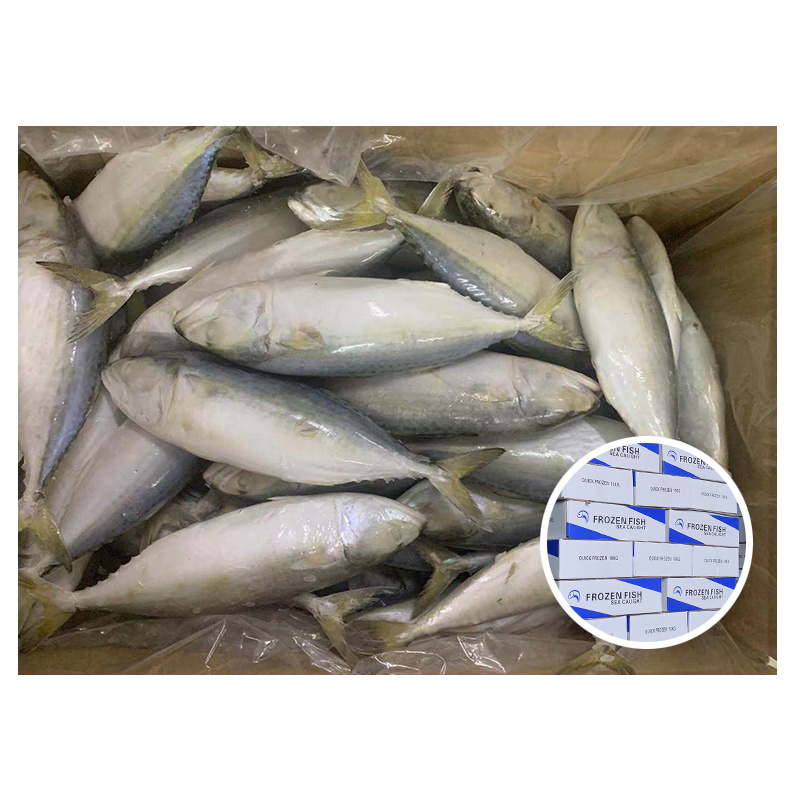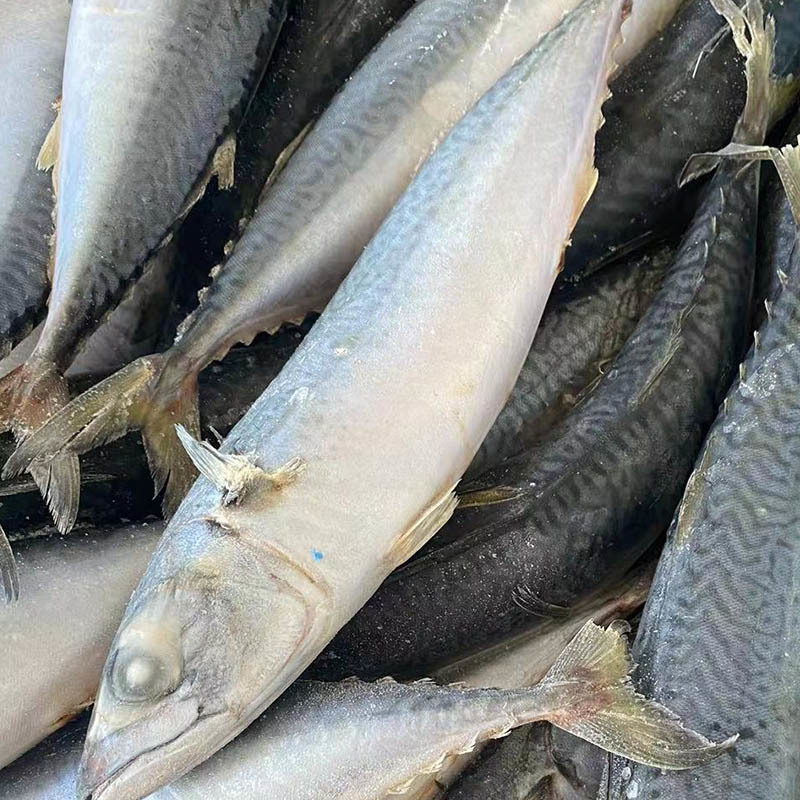The company's mission is to provide high-quality seafood to global buyers.
WhatsApp / WeChat : +8618659702877
Unveiling the Nutritional Value of Pacific Mackerel (Scomber Japonicus): A Deep Dive into Benefits and Uses
2025-09-12
Understanding Pacific Mackerel (Scomber Japonicus)
Pacific Mackerel, scientifically known as Scomber Japonicus, is a species of fish that belongs to the Scombridae family. This fish is not only renowned for its delicious flavor but also for its impressive nutritional profile. Found primarily in the temperate waters of the Pacific Ocean, Pacific Mackerel is a staple in various cuisines, particularl
Understanding Pacific Mackerel (Scomber Japonicus)
Pacific Mackerel, scientifically known as Scomber Japonicus, is a species of fish that belongs to the Scombridae family. This fish is not only renowned for its delicious flavor but also for its impressive nutritional profile. Found primarily in the temperate waters of the Pacific Ocean, Pacific Mackerel is a staple in various cuisines, particularly in Asian and Mediterranean dishes. In this article, we will thoroughly explore the nutritional value of Pacific Mackerel and its numerous health benefits.
Table of Contents
- 1. Nutritional Profile of Pacific Mackerel
- 2. Health Benefits of Pacific Mackerel
- 3. Cooking with Pacific Mackerel
- 4. Environmental Impact and Sustainability of Pacific Mackerel
- 5. Selecting and Storing Pacific Mackerel
- 6. Frequently Asked Questions
- 7. Conclusion
1. Nutritional Profile of Pacific Mackerel
Pacific Mackerel is a powerhouse of nutrients. A 100-gram serving of cooked Pacific Mackerel typically contains:
- Calories: Approximately 205
- Protein: 20 grams
- Fat: 13 grams
- Saturated Fat: 3 grams
- Omega-3 Fatty Acids: 2.5 grams
- Vitamin D: 600 IU (150% of Daily Value)
- Vitamin B12: 19 micrograms (316% of Daily Value)
- Selenium: 40 micrograms (57% of Daily Value)
- Niacin: 6.8 milligrams (34% of Daily Value)
The high levels of omega-3 fatty acids, particularly EPA and DHA, are particularly noteworthy. These essential fats play a crucial role in heart health, brain function, and overall well-being.
2. Health Benefits of Pacific Mackerel
The health benefits of Pacific Mackerel are extensive, making it an excellent addition to any diet.
Heart Health
The rich omega-3 fatty acids found in Pacific Mackerel can significantly lower triglyceride levels, reduce blood pressure, and decrease the risk of heart disease. Regular consumption of omega-3s is linked to improved cardiovascular health, making Pacific Mackerel a heart-friendly choice.
Brain Function
Research shows that omega-3 fatty acids can enhance cognitive function and reduce the risk of neurodegenerative diseases. The DHA present in Pacific Mackerel is crucial for brain health, supporting memory, mood regulation, and overall cognitive performance.
Weight Management
High in protein and healthy fats, Pacific Mackerel can aid in weight management. Protein promotes feelings of fullness, which can help control appetite and reduce overall calorie intake. Including this fish in your meals can be a satisfying and nutritious way to support weight loss or maintenance.
Bone Health
With significant levels of vitamin D and calcium, Pacific Mackerel supports strong bones. Vitamin D is essential for calcium absorption and plays a vital role in bone density, making this fish a valuable dietary choice for maintaining bone health.
Anti-Inflammatory Properties
The omega-3 fatty acids in Pacific Mackerel also exhibit anti-inflammatory properties. Regular consumption can help reduce inflammation in the body, potentially alleviating symptoms of conditions like arthritis and promoting overall wellness.
3. Cooking with Pacific Mackerel
Pacific Mackerel is versatile in the kitchen and can be prepared in various ways to enhance its flavor and nutritional benefits.
Grilling Pacific Mackerel
Grilling is one of the best methods to cook Pacific Mackerel, as it preserves the fish's natural oils and flavor. Marinate it with lemon juice, garlic, and herbs for a delicious dish that highlights its rich taste.
Baking Pacific Mackerel
Baking Pacific Mackerel with vegetables is another healthy option. The fish retains its moisture and flavors, making it a delightful meal when paired with seasonal vegetables and herbs.
Smoking Pacific Mackerel
Smoked Pacific Mackerel offers a unique flavor profile, perfect for adding to salads or serving as a topping for crackers. The smoking process enhances its taste while maintaining the nutritional benefits.
Sushi and Sashimi
In Japanese cuisine, Pacific Mackerel is often used in sushi and sashimi preparations. Its rich texture and flavor make it a favorite amongst sushi lovers.
4. Environmental Impact and Sustainability of Pacific Mackerel
Sustainable fishing practices are essential for the long-term health of Pacific Mackerel populations. Overfishing and environmental changes can threaten this species, making it crucial to source Pacific Mackerel from sustainable fisheries.
When choosing Pacific Mackerel, look for certifications such as the Marine Stewardship Council (MSC) label, which indicates that the fish has been caught using sustainable practices. Supporting sustainable fishing helps preserve marine ecosystems and ensures that future generations can enjoy this nutritious fish.
5. Selecting and Storing Pacific Mackerel
Proper selection and storage of Pacific Mackerel are essential to maintain its quality and safety.
How to Select Fresh Pacific Mackerel
When purchasing Pacific Mackerel, look for shiny, vibrant skin with no discoloration. The eyes should be clear, and the flesh should be firm to the touch. Avoid fish with a strong, fishy odor, as this can indicate spoilage.
Storing Pacific Mackerel
Fresh Pacific Mackerel should be refrigerated and consumed within two days of purchase. If you need to store it longer, consider freezing it. Wrap the fish tightly in plastic wrap or aluminum foil and place it in an airtight container before freezing to prevent freezer burn. Properly stored, frozen Pacific Mackerel can last for up to three months.
6. Frequently Asked Questions
What are the best ways to cook Pacific Mackerel?
Pacific Mackerel can be grilled, baked, smoked, or prepared as sushi and sashimi. Each method highlights its rich flavors and nutritional value.
Is Pacific Mackerel high in mercury?
Compared to larger fish species, Pacific Mackerel tends to have lower mercury levels. However, it's essential to consume it in moderation, especially for pregnant women and young children.
Can I eat Pacific Mackerel every day?
While Pacific Mackerel is healthy and nutritious, it is advisable to consume a variety of fish in your diet to minimize the risk of exposure to environmental contaminants.
How does Pacific Mackerel compare to other fish?
Pacific Mackerel is higher in omega-3 fatty acids than many other fish, such as salmon and tuna. Its nutritional profile makes it an excellent choice for promoting heart and brain health.
Where can I buy fresh Pacific Mackerel?
Fresh Pacific Mackerel can be found at local fish markets, grocery stores, or online seafood suppliers. Look for suppliers that prioritize sustainability and freshness.
7. Conclusion
Exploring the nutritional value of Pacific Mackerel (Scomber Japonicus) reveals a wealth of health benefits and culinary possibilities. Rich in omega-3 fatty acids, essential vitamins, and protein, this fish is an excellent addition to a balanced diet. By understanding how to select, store, and prepare Pacific Mackerel, we can enjoy its unique flavor and health benefits while supporting sustainable fishing practices. Embrace this nutrient-dense fish in your meals, and harness the power of Pacific Mackerel for a healthier lifestyle.
Pacific Mackerel Scomber Japonicus
RELEVANT INFORMATION
Understanding Pacific Mackerel (Scomber Japonicus)
Pacific Mackerel, scientifically known as Scomber Japonicus, is a species of fish that belongs to the Scombridae family. This fish is not only renowned for its delicious flavor but also for its impressive nutritional profile. Found primarily in the temperate waters of the Pacific Ocean, Pacific Mackerel is a staple in various cuisines, particularl
2025-09-12
A Comprehensive Guide to Small Eyes Horse Mackerel: Nutritional Benefits and Culinary Uses
Small Eyes Horse Mackerel, scientifically known as *Trachurus japonicus*, is a popular species in the family Carangidae, often appreciated for its delicious taste and nutritional benefits. Commonly found in subtropical and temperate waters, this fish is not only a staple in various cuisines but also a key source of essential nutrients that can significantly contribute to a balanced diet.
One of th
2025-09-09
Squid Tentacle vs. Other Seafood: A Comparative Taste Test That Will Delight Your Palate
Squid Tentacle vs. Other Seafood: A Comparative Taste Test
Introduction to Seafood Sensations
The world of seafood is vast and varied, offering an incredible array of flavors, textures, and culinary possibilities. Among the many treasures of the ocean, squid tentacles stand out not only for their unique taste but also for their versatility in preparation. In this article, we will explore the c
2025-09-06







